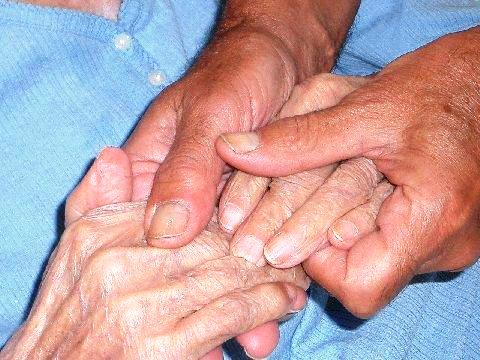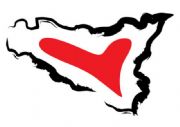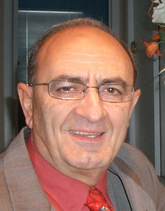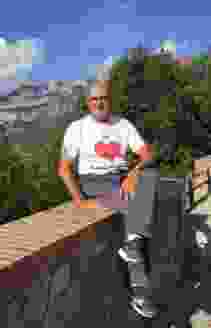
Le nostre mani / Our hands
Brano tratto dall’originale (Our hands), in “Sunday Spiritual Bouquets”, di Mario Macaluso Ph.D., tradotto in Italiano dallo stesso Autore;
di seguito, in questa stessa pagina, la versione inglese originale
Mi affascina tantissimo osservare la bellezza umana e spirituale delle nostre mani. Attraverso i secoli, artisti, pittori, scultori e scrittori hanno studiato ed espresso il significato profondo che si nasconde nelle mani.
Io scruto lentamente le mie e ne studio attentamente i dettagli. Le muovo intorno con meraviglia e le giro e rigiro. Non sono più giovani. Cominciano a sembrare sempre di più come quelle di mio padre. Vi noto la gonfiezza artritica delle nocche e mi stupisce quando penso alle migliaia di cose che hanno fatto durante tutta la mia vita: legandomi le scarpe, vestendomi e cibandomi, scrivendo, stringendo altre mani, pregando, salutando, e facendo del bene e anche del male.
Le mani sono per me la parte più significativa del corpo umano. Michelangelo le usò per esprimere ed esaltare artisticamente l’istante cosmico quando il Creatore, nel racconto biblico, toccò il dito di Adamo e uno scatto elettrico di energia divina fece scintillare in lui il principio della vita umana. Bernini ne immortalò le espressioni più belle, e il famoso scultore francese, Auguste Rodin, passò molti anni a studiarne il senso misterioso e profondo.
Romanzieri e drammaturgi, come per esempio, Paul Claudel, scrissero novelle e scene teatrali dove il movimento sinfonico delle mani, che si muovono nello spazio e nel tempo, esprime molto di più delle parole ed è tanto espressivo quanto i passi delicati di un balletto classico.
Gesù usò le sue mani con maestria e autorità quando annunziò la Buona Novella del regno di Dio; quando pregò; quando calmò il mare in tempesta e diede la vista ai ciechi; quando cibò la folla affamata e benedisse i bambini, e soprattutto nel momento in cui spezzò il pane e condivise il calice dell’Ultima Cena.
Io mi chiedo certe volte: “Chissà come saranno state splendide le mani di Gesù o quanta gente avrà cercato di toccarle per sentirne la dolcezza e la potenza!” Che esperienza straordinaria sarà stata quella di stringere quelle mani così significative e fortemente magnetiche!
Adesso Gesù non è più fra di noi per guarire, fare del bene, ed annunziare il regno di Dio. Ora tocca a noi doverlo fare per Lui attraverso l’opera delle nostre mani. Mani grandi e mani piccole, mani bianche e mani nere, mani delicate e mani incallite sono tutte necessarie per spargere il regno di Dio. Gesù ha bisogno di tutte queste mani per continuare i suoi miracoli e per dare alla sua grazia divina la forza e la possibilità di raggiungere i confini della terra.
Quanta differenza creano le nostre mani quando stacchiamo il telefono per consolare gli afflitti; quando scriviamo una email o una lettera affettuosa; quando teniamo fra le braccia un bambino che piange; quando salutiamo un estraneo per la strada; quando confortiamo coloro che hanno perduto qualcuno; o quando offriamo il nostro aiuto ai giovani e agli anziani che hanno bisogno di appoggio e d’incoraggiamento!
In queste circostanze le nostre mani diventano un mezzo fecondo di grazia e di fede.
Attraverso il loro dono, noi diventiamo capaci di riempire cuori vuoti, di far splendere il sole attorno a noi e di rendere credibile e possibile l’amore di Dio, dimostrando così la potente realtà della fede.
Per me è un momento speciale quando osservo le mani nell’atto di benedire. Guardo quelle del clero che benedicono i fedeli; osservo attentamente quelle dei genitori e dei nonni che benedicono i loro figli e nipotini. Oh! quanto m’incantano le mani delle mamme che gesticolano dietro i vetri della finestra quando le salutiamo al momento di partire!
C’è un significato profondo che emana dalle mani del povero, del bambino, dell’anziano e del bisognoso quando queste si estendono per chiedere aiuto o esprimere gratitudine e ringraziamento.
Esaminiamo per un momento le nostre mani! Questo capolavoro di Dio non ci lascia incantati? Io osservo le mie. Come sono veramente misteriose e stupende! Le guardo attentamente e mi rendo conto che non sono state fatte solo per me, ma anche per gli altri. Le mie mani sono state chiamate a portare la presenza di Dio nella vita della gente e a servirlo nel nostro prossimo perchè questo mondo diventi un luogo più bello e migliore per tutti.
Credo veramente che quando le nostre mani sono occupate in opere corporali e spirituali, noi portiamo la presenza di Dio e la sua grazia negli angoli più bui delle nostre città, dei nostri villaggi e dei nostri casolari.
Un santo uomo, Vincenzo Pallotti, consapevole di questa realtà, scrisse queste belle parole: “Spesso la grazia di Dio è avvolta in una crosta di pane.”
Forse anche nella nostra famiglia ci sarà qualcuno che l’aspetta da tanti anni.
________________________________________________________________________
Our Hands
I am very fascinated when I observe the human and spiritual beauty of human hands.Through the centuries, artists, painters, sculptors and writers have studied and expressed the profound meaning, which is hidden in human hands.
I scrutinize mine very slowly, and study attentively their details. I wave them in awe, as I turn each palm around. They are no longer young. They are beginning to look more and more like those of my father. I notice the arthritic puffiness in their knuckles, and marvel at all the things that they have done throughout my whole life: tying my shoes, dressing up and feeding my body, writing and reaching out to others, shaking hands, folding them in prayer, and using them, from time to time, to do even evil deeds.
Human hands are for me the most expressive part of the body!
Michelangelo used them to depict and to exalt artistically the cosmic instant when the Creator, in the biblical account of Creation, reached out to Adam’s finger and an electric shock of divine energy sparked the beginning of human life. Bernini immortalized their most beautiful expressions, and the famous French sculptor, Auguste Rodin, spent many years studying their mysterious and profound meaning. Novelists and play-writers, such as Paul Claudel, wrote novels and theatrical scenes where the symphonic movement of human hands, motioning in space and time, expresses more than words, and is as beautiful as the delicate steps of classic ballet.
Jesus used his hands masterfully and with authority when he announced the Good News of the kingdom of God; when he prayed; when he calmed the stormy sea and gave sight to the blind; when he fed the hungry crowd and blessed the children and, above all, when he broke bread and shared the cup at the Last Supper. Sometimes I wonder how splendid Jesus’ hands must have been or how many people must have reached out to feel their softness and power! They must have been so expressive and magnetic! What an extraordinary experience must have been to shake those hands, which had to be very expressive and attractive!
Now Jesus is no longer among us to heal, to do good, and to announce the kingdom of God. He left up to us the task of doing it for him through the work of our hands.Big and small hands, white and black hands, delicate and rough hands, they are all needed to spread the kingdom of God. Jesus needs all these hands to continue to work his miracles and to give his divine grace the strength and possibility of reaching to the ends of the earth. What a difference our hands do make when we pick up the phone to console the afflicted; write an email or a love letter; when we hold safely a baby crying; when we greet a stranger on the street; when we comfort someone who has had a recent loss; or when we offer help to young and old people who need support and reassurance! On these occasions, our hands are a fruitful means of grace and faith. Through their gift, we are able to fill empty hearts, bring sunshine around, and to make credible and possible the love of God, thus showing the powerful reality of faith. For me it is a very special moment when I see human hands in the act of blessing. I look at those of clergy blessing the congregation; those of parents and grandparents blessing their children and grandchildren; and I am fascinated by the hands of mothers, when they are waiving by the window, as we bid them good-bye at the moment of our departure.
A profound meaning emanates from the hands of the poor, the children, the aged, and the needy when they wave to ask us for help or reach out to express gratitude and thanksgiving. Let us examine our hands for a moment. Aren’t we mesmerized by this masterpiece created by God? I look at mine in awe. They are truly mysterious and stupendous.
As I keep on looking, I realize that they were not made for me alone, but to benefit others.My hands have been called to bring the presence of God in the lives of people and to serve him in our neighbors so that we can make this world a beautiful place to live. I truly believe that when our hands are engaged in corporal and spiritual works of mercy, we bring God’s presence and grace to the darkest corners of our cities, villages and hamlets.
A holy man, Vincenzo Pallotti, aware of this spiritual reality, wrote: “Often the grace of God is wrapped in the crust of a piece of bread.”
Maybe even in our family there might be someone, who has being waiting for the grace of God for many years.









